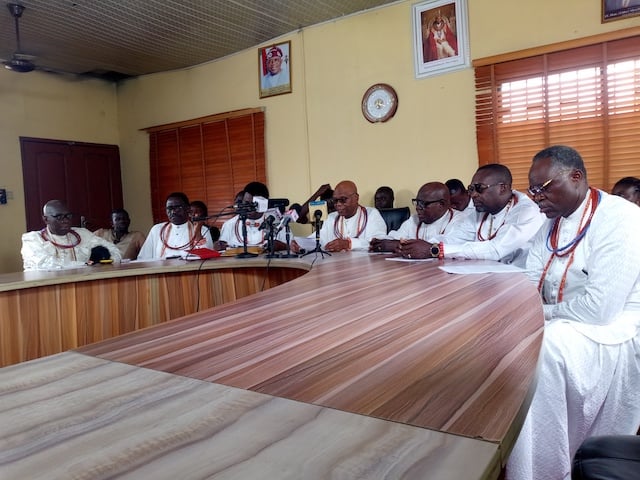The Itsekiri-Ijaw conflict, a protracted struggle over land and resources in Warri Federal Constituency, Delta State, Nigeria, has recently reignited, prompting calls for government intervention and peacebuilding measures. The current tension revolves around the placement of banners celebrating the 10th coronation anniversary of the Pere of Ogbe-Ijoh, an Ijaw monarch, within what the Itsekiri Traditional Council claims is their ancestral territory. This action has been perceived as a deliberate provocation, leading to the destruction of the banners by Itsekiri youths and escalating the long-standing inter-ethnic rivalry.
The Itsekiri Traditional Council, speaking through Chief Brown Mene, the Ogwa-Olusan of Warri Kingdom, has called on Delta State Governor Sheriff Oborevwori to establish a panel of inquiry to investigate the escalating tensions. They argue that the placement of the banners disrespects existing court rulings, exacerbates historical grievances, and threatens the delicate peace in the region. The Council insists that the banners were erected within Itsekiri territory, a claim supported by a lower court ruling, although the ruling is currently under appeal. They view the act as a provocative disregard for the rule of law and a potential catalyst for widespread unrest. Their demand for a panel underscores the urgency of the situation and the need for a neutral body to examine the facts and recommend appropriate solutions.
Beyond the immediate incident of the banners, the Itsekiri chiefs emphasize the deeper historical context of the conflict and the importance of respecting legal processes. They maintain that they have consistently advocated for upholding the law, regardless of ethnic affiliations, and urge all parties to respect the judiciary’s role in resolving the land dispute. This consistent call for legal adherence positions the Itsekiri community as champions of the rule of law and casts the banner incident as a blatant violation of this principle. By framing their position in this manner, they seek to garner support for their cause and portray the opposing side as instigators of conflict.
The escalating tensions have also drawn concerns from various stakeholders within and beyond the immediate communities involved. Youth leaders, such as Comrade Bene Youkore Mamamu, National President of the Niger Delta Youth Council, Recognizing the potential for the situation to spiral into major violence, have called on national security agencies to step in and mediate before the conflict escalates further. This call for intervention highlights the gravity of the situation and the fear of a return to the large-scale ethnic clashes that have plagued the region in the past. The potential for violence is not merely a theoretical concern; it is a vivid memory for many residents of Warri, who have experienced the devastating consequences of such conflicts firsthand.
Furthermore, community spokespeople like Godspower Gbenekama, the Fiowei of Gbaramatu Kingdom, have also weighed in on the conflict, criticizing the alleged involvement of security personnel in the removal of the banners. Accusations of security force bias further complicate the situation and fuel mistrust between the communities and the authorities tasked with maintaining order. Gbenekama’s call for Governor Oborevwori to convene a multi-ethnic dialogue reflects the broader understanding that a lasting solution requires communication and collaboration between all stakeholders, including the Itsekiri, Ijaw, Urhobo, and other communities in the region. This emphasizes the need for a comprehensive approach that addresses not only the immediate triggers of the conflict but also the underlying historical grievances and socio-economic factors that contribute to inter-ethnic tensions.
The current tension between the Itsekiri and Ijaw communities underscores the fragility of peace in the Warri region. The competing claims over land, resources, and political power are deeply rooted in history and continue to fuel distrust and animosity. The removal of the coronation banners served as a spark that ignited simmering tensions, highlighting the unresolved issues and the potential for rapid escalation. The calls for government intervention, judicial processes, and inter-community dialogue underscore the urgent need for a multifaceted approach to conflict resolution that addresses both the immediate concerns and the underlying causes of the conflict. A failure to address these issues comprehensively risks further exacerbating the situation and jeopardizing the stability of the region. Ultimately, achieving lasting peace requires a commitment from all stakeholders to engage in constructive dialogue, respect the rule of law, and prioritize the common good over narrow ethnic interests.


